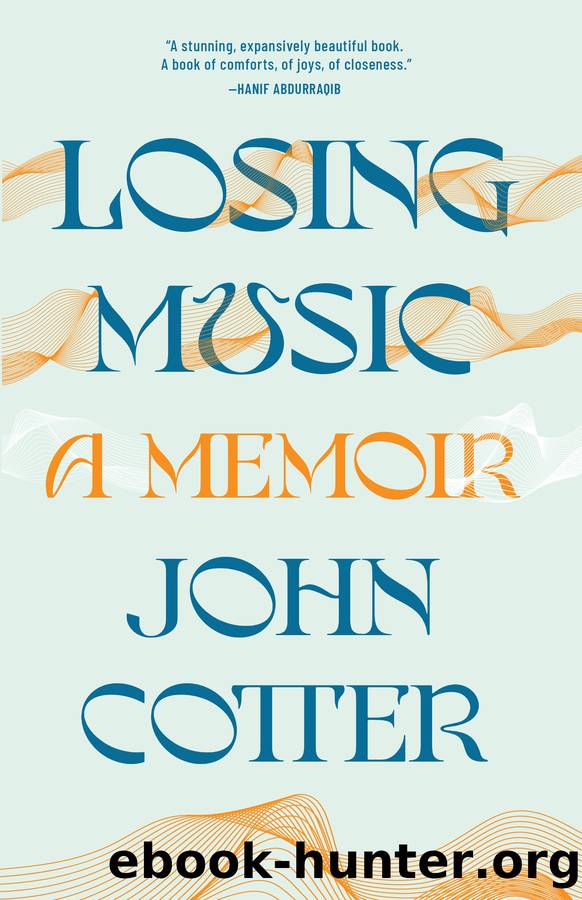Losing Music by John Cotter

Author:John Cotter
Language: eng
Format: epub
Publisher: Milkweed Editions
âALICE NOTLEY, IN THE PINES
The Trauma Test
Albert Camus called the feeling of the absurdâthe feeling, for example, that my ears might be dying for no real reason; that I didnât cause this, or that few of us cause all the misfortune that befalls us, or particularly deserve it (nor would we particularly deserve reprieve; we donât deserve each morningâs sunrise)âa sensation of âsin without God.â In Camusâs metaphysics, the only thing to do in the face of the absurd is to revolt: to look the absurd in the eye and to carry on, to insure the absurd does not break you.
How could I look the absurd in the eye? I had one idea. Lighthouse was sending teachers to a homeless shelter in eastern Colorado as part of a community engagement program. A new shelter, Fort Lyon, had been a prison when I first fell ill. Before that it was a VA hospital, and before that a mental institution, and before that a cavalry fort, the one from which the Sand Creek Massacre was launched in 1864. A hundred and fifty women and children and elderly peace-minded men of the Cheyenne and Arapaho tribes were slaughtered in a matter of hours. The stables where the cavalryâs horses had been fed and watered stood in back of the fort, the oldest buildings on the site. Colorado Coalition for the Homeless was bussing people into the fort from around the state: Grand Junction, Pueblo, Trinidad. They needed teachers. I needed a change.
Before I signed up I paid a visit to my psychologist, Carolyn, a worldly woman in her seventies who dressed sharp as a dart. She settled tidily into a plush chair and crossed her legs. I told her I hoped a month among people whoâd suffered extremities of loss might help me to feel less alone. Teaching at the homeless shelter might make me feel useful.
I had a good home with Elisa, but disability is a well-traveled road to homelessness. I thought also of those ninteenth century Ugly Laws: if you were disabled displaying yourself on the street, you were presumed to be begging. My own trauma had been easier, so far, than that of the residents at Fort Lyon, but that didnât mean I didnât have plenty to learn from people so intimate with loss.
âI worry youâll be lonely at the shelter,â Carolyn said. âYou might feel very lonely, even abandoned.â
I barely listened. âIâm lonely here.â
When I first started talking to Carolyn, Iâd faked a kind of bonhomie in her office until I started to feel myself really becoming that way around her, and then around others. It was probably medicinal. And it freed me up to expand our catalogue of subjects. It was Carolyn who first told me about John Speke, marooned on an island of Lake Tanganyika in 1858, spear tip of the imperialist assault. Speke convinced himself an insect had flown into his ear, one that began âwith exceeding vigor, like a rabbit at a hole, to dig violently away at my tympanum.
Download
This site does not store any files on its server. We only index and link to content provided by other sites. Please contact the content providers to delete copyright contents if any and email us, we'll remove relevant links or contents immediately.
Cecilia; Or, Memoirs of an Heiress — Volume 2 by Fanny Burney(31956)
Cecilia; Or, Memoirs of an Heiress — Volume 3 by Fanny Burney(31942)
Fanny Burney by Claire Harman(26603)
We're Going to Need More Wine by Gabrielle Union(19046)
Plagued by Fire by Paul Hendrickson(17412)
All the Missing Girls by Megan Miranda(16027)
Cat's cradle by Kurt Vonnegut(15355)
For the Love of Europe by Rick Steves(14121)
Bombshells: Glamour Girls of a Lifetime by Sullivan Steve(14075)
Leonardo da Vinci by Walter Isaacson(13336)
4 3 2 1: A Novel by Paul Auster(12392)
The remains of the day by Kazuo Ishiguro(8999)
Adultolescence by Gabbie Hanna(8927)
Note to Self by Connor Franta(7671)
Diary of a Player by Brad Paisley(7578)
Giovanni's Room by James Baldwin(7346)
What Does This Button Do? by Bruce Dickinson(6207)
Ego Is the Enemy by Ryan Holiday(5448)
Born a Crime by Trevor Noah(5382)
